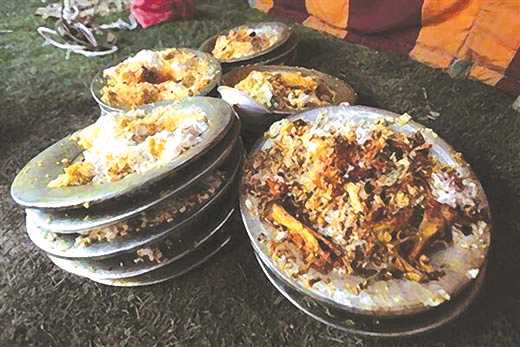“Eat and drink: But waste not by excess, for Allah loveth not the wasters” (Surat Al-A’raf 7: 31)
By: Javid Amin
Kashmiri weddings, celebrated for their opulence and grandeur, often feature extravagant feasts. Families invest considerable resources in creating lavish spreads to commemorate these joyous occasions. However, this lavishness has a considerable downside – a staggering amount of food wastage.
A study conducted by the Food and Agriculture Organization of the United Nations (FAO) has revealed that up to 40% of the food served at Kashmiri weddings goes to waste. Several factors contribute to this issue. The expansive scale of these weddings, which can host hundreds or even thousands of guests, demands vast quantities of food. Additionally, cultural expectations of generosity and hospitality drive hosts to provide an array of dishes, often leading to excess preparation. Lastly, limited awareness about the repercussions of food wastage compounds the problem.
To tackle this issue, there are practical steps that can be adopted:
1. Thoughtful Menu Planning: Meticulously plan the wedding menu, taking care to prepare only what is necessary to minimize waste. When planning the menu, consider the number of guests you will have and the type of food they will enjoy. It is also important to factor in the time of year and the weather conditions. For example, you may want to prepare lighter food in the summer and heavier food in the winter. To avoid overpreparing food, it can be helpful to create a menu planner and track the amount of food you are preparing. You can also ask your guests to RSVP in advance so that you can get a better idea of how many people will be attending.
2. Encourage Guests to Take Home Leftovers: One way to reduce food wastage is to encourage guests to take home leftovers. This can be done by providing disposable containers or by asking guests to bring their own containers. You can also make it easy for guests to take home leftovers by placing them in convenient locations, such as near the exit. Offer a variety of leftover containers. This will allow guests to choose the size and type of container that they need. Place the leftover containers in a convenient location. Guests should be able to easily find the leftover containers and take them with them. Label the leftover containers. This will help guests to identify the food that they are taking home. Encourage guests to take home leftovers early. This will help to prevent the food from spoiling.
3. Compost Food Scraps: Composting food scraps is a great way to reduce food wastage and create nutrient-rich soil for your plants. If you do not have a compost bin, you can donate your food scraps to a local community garden or composting program. Choose a compost bin that is the right size for your needs. Add a variety of food scraps to your compost bin, including fruits, vegetables, coffee grounds, and tea bags. Keep the compost bin moist, but not soggy. Turn the compost bin regularly to help it decompose evenly. Harvest the compost when it is dark brown and crumbly.
4. Donate Surplus Food to Charity or Food Banks: If you have surplus food that will not be eaten, you can donate it to charity or to food banks. This is a great way to ensure that the food does not go to waste and that it helps people in need. Contact local charities and food banks to see if they accept food donations. Make sure that the food is safe to eat. This means that it should not be spoiled or expired. Transport the food safely. Keep the food cold or frozen, depending on the type of food. Label the food with the date of donation and the type of food.
By following these comprehensive tips, you can help to reduce food wastage at Kashmiri weddings and make them more sustainable, aligning these celebrations with responsible and environmentally conscious practices.






